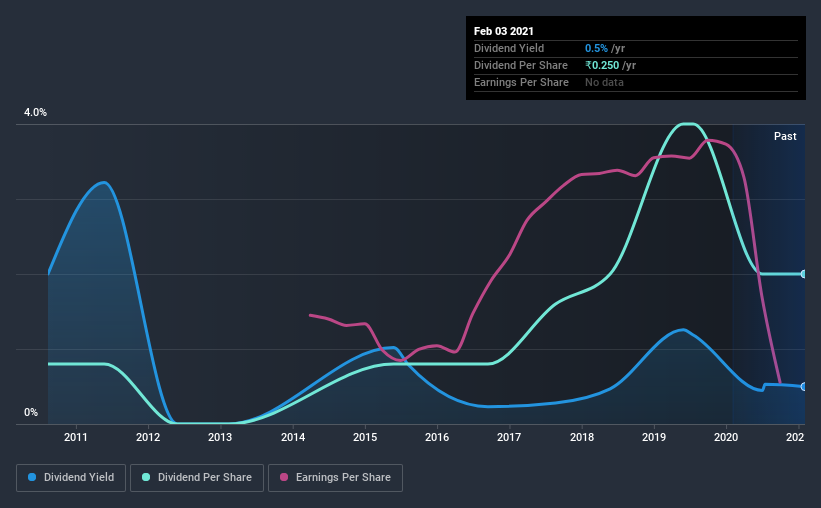- India
- /
- Paper and Forestry Products
- /
- NSEI:KUANTUM
Is Kuantum Papers Limited's (NSE:KUANTUM) 0.5% Dividend Sustainable?
Is Kuantum Papers Limited (NSE:KUANTUM) a good dividend stock? How can we tell? Dividend paying companies with growing earnings can be highly rewarding in the long term. Yet sometimes, investors buy a stock for its dividend and lose money because the share price falls by more than they earned in dividend payments.
A slim 0.5% yield is hard to get excited about, but the long payment history is respectable. At the right price, or with strong growth opportunities, Kuantum Papers could have potential. That said, the recent jump in the share price will make Kuantum Papers's dividend yield look smaller, even though the company prospects could be improving. Some simple research can reduce the risk of buying Kuantum Papers for its dividend - read on to learn more.
Click the interactive chart for our full dividend analysis

Payout ratios
Companies (usually) pay dividends out of their earnings. If a company is paying more than it earns, the dividend might have to be cut. So we need to form a view on if a company's dividend is sustainable, relative to its net profit after tax. Kuantum Papers paid out 18% of its profit as dividends, over the trailing twelve month period. We like this low payout ratio, because it implies the dividend is well covered and leaves ample opportunity for reinvestment.
In addition to comparing dividends against profits, we should inspect whether the company generated enough cash to pay its dividend. Last year, Kuantum Papers paid a dividend while reporting negative free cash flow. While there may be an explanation, we think this behaviour is generally not sustainable.
Consider getting our latest analysis on Kuantum Papers' financial position here.
Dividend Volatility
From the perspective of an income investor who wants to earn dividends for many years, there is not much point buying a stock if its dividend is regularly cut or is not reliable. For the purpose of this article, we only scrutinise the last decade of Kuantum Papers' dividend payments. This dividend has been unstable, which we define as having been cut one or more times over this time. During the past 10-year period, the first annual payment was ₹0.1 in 2011, compared to ₹0.3 last year. Dividends per share have grown at approximately 9.6% per year over this time. The dividends haven't grown at precisely 9.6% every year, but this is a useful way to average out the historical rate of growth.
It's good to see the dividend growing at a decent rate, but the dividend has been cut at least once in the past. Kuantum Papers might have put its house in order since then, but we remain cautious.
Dividend Growth Potential
With a relatively unstable dividend, it's even more important to evaluate if earnings per share (EPS) are growing - it's not worth taking the risk on a dividend getting cut, unless you might be rewarded with larger dividends in future. Kuantum Papers' EPS have fallen by approximately 11% per year during the past five years. A sharp decline in earnings per share is not great from from a dividend perspective, as even conservative payout ratios can come under pressure if earnings fall far enough.
Conclusion
When we look at a dividend stock, we need to form a judgement on whether the dividend will grow, if the company is able to maintain it in a wide range of economic circumstances, and if the dividend payout is sustainable. First, we like Kuantum Papers' low dividend payout ratio, although we're a bit concerned that it paid out a substantially higher percentage of its free cash flow. Second, earnings per share have been in decline, and its dividend has been cut at least once in the past. Overall, Kuantum Papers falls short in several key areas here. Unless the investor has strong grounds for an alternative conclusion, we find it hard to get interested in a dividend stock with these characteristics.
It's important to note that companies having a consistent dividend policy will generate greater investor confidence than those having an erratic one. At the same time, there are other factors our readers should be conscious of before pouring capital into a stock. Just as an example, we've come accross 6 warning signs for Kuantum Papers you should be aware of, and 2 of them shouldn't be ignored.
If you are a dividend investor, you might also want to look at our curated list of dividend stocks yielding above 3%.
If you decide to trade Kuantum Papers, use the lowest-cost* platform that is rated #1 Overall by Barron’s, Interactive Brokers. Trade stocks, options, futures, forex, bonds and funds on 135 markets, all from a single integrated account. Promoted
Valuation is complex, but we're here to simplify it.
Discover if Kuantum Papers might be undervalued or overvalued with our detailed analysis, featuring fair value estimates, potential risks, dividends, insider trades, and its financial condition.
Access Free AnalysisThis article by Simply Wall St is general in nature. It does not constitute a recommendation to buy or sell any stock, and does not take account of your objectives, or your financial situation. We aim to bring you long-term focused analysis driven by fundamental data. Note that our analysis may not factor in the latest price-sensitive company announcements or qualitative material. Simply Wall St has no position in any stocks mentioned.
*Interactive Brokers Rated Lowest Cost Broker by StockBrokers.com Annual Online Review 2020
Have feedback on this article? Concerned about the content? Get in touch with us directly. Alternatively, email editorial-team (at) simplywallst.com.
About NSEI:KUANTUM
Kuantum Papers
Produces, markets, and sells agro and wood-based paper products in India.
Average dividend payer with slight risk.
Market Insights
Community Narratives



